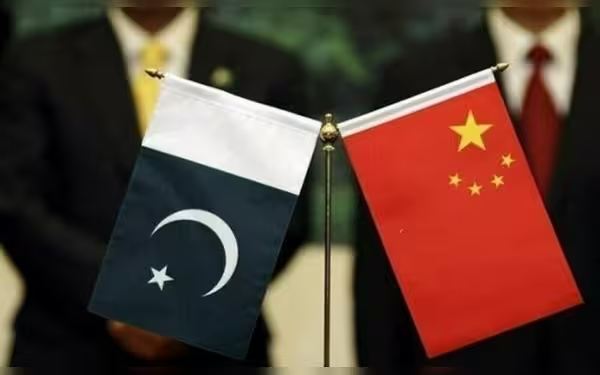Saturday, November 16, 2024 05:58 PM
Chinese Investment Surge in Pakistan: 25 Companies Show Interest
- 25 Chinese firms express investment interest in Pakistan.
- Key sectors include agriculture, technology, and infrastructure.
- Pakistan's youth population offers a robust labor force.
 Image Credits: brecorder
Image Credits: brecorder25 Chinese companies express interest in investing in Pakistan, focusing on agriculture, technology, and infrastructure, promising economic growth.
In a significant development for Pakistan's economy, 25 major Chinese investment companies have shown a keen interest in investing heavily in the country. This interest was expressed during a business roundtable conference held in Chaoyang District, Beijing. The conference included representatives from various sectors such as agriculture, automobile, electrical alliances, pharmaceuticals, logistics, medical equipment, and technology.
The event was presided over by Abdul Aleem Khan, the Federal Minister for Board of Investment, Privatization & Communications. It took place at the Pakistani Embassy in China and was attended by numerous dignitaries, including Anna Su, the Country Director of a Hong Kong business group, and Khalil Hashmi, the Ambassador of Pakistan to China. The discussions focused on enhancing cooperation between China and Pakistan, leading to the signing of several Memorandums of Understanding (MoUs) in fields like textile technology, agriculture, and animal husbandry.
During his keynote address, Abdul Aleem Khan highlighted the demographic advantage of Pakistan, noting that 70% of its population is youth, making it the fifth largest country in the world with a population of 230 million. He emphasized that this demographic provides a robust labor force and a growing consumer market. Khan stated, "With China, we will make bilateral investments in education, technology, and various sectors in Pakistan, which is a major partner in China’s Belt Road Initiative (BRI) and projects like the China-Pakistan Economic Corridor (CPEC)."
Furthermore, he pointed out that Pakistan possesses the second-largest reserves of coal and the seventh-largest reserves of copper, positioning the country as a potential hub for business activities in the region. He assured that the investment atmosphere in Pakistan is favorable and welcomed Chinese companies to consider relocating their industries to Pakistan. Khan described the roundtable conference as a milestone in fostering these investment opportunities.
In addition to the discussions on general investment, the Chairman of China Roads and Bridges Corporation, Du Fie, met with Abdul Aleem Khan to discuss the privatization of Distribution Companies (DISCOs) in Pakistan and investment in the Special Economic Zone of Karachi. The Chinese officials also expressed their willingness to cooperate on several infrastructure projects, including the Sukkur-Hyderabad Motorway M-6 and the Hyderabad-Karachi Motorway M-9.
Abdul Aleem Khan also mentioned the potential collaboration between Pakistan’s technical institutions and Chengdu University of China in the technology sector. He expressed a strong interest in Public-Private Partnerships and Business-to-Business activities, describing the meetings with Chinese experts in textiles, leather, green energy, and furniture as positive and beneficial for both countries.
This growing interest from Chinese companies signifies a promising future for Pakistan's economy, especially in sectors that can leverage the country's natural resources and youthful workforce. As these discussions progress, it is crucial for Pakistan to create a conducive environment for foreign investments, ensuring that both local and international businesses can thrive. The collaboration between Pakistan and China could pave the way for significant economic growth, benefiting both nations in the long run.













